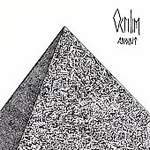|
|
 |
Dusted Reviews
Artist: Ocrilim Album: Anoint Label: I and Ear Review date: Jul. 25, 2006 |

|
|
|
 |
Back when Mick Barr performed solo under the moniker of Octis, he released an album entitled Ocrilim, on which he played his signature brand of lightspeed guitar soloing, with rapid bouts of shredding interrupted repeatedly by controlled and constrained bursts of feedback. Anoint finds Barr now performing under the name of Octis’ 2005 release, though the material found within is, at least by Barr’s standards, something completely different. There’s still enough in the way of lightning-fast guitar pyrometrics to sustain Barr’s reputation as a technical player par excellence, but unlike the highly regimented structure of Ocrilim, Anoint isn’t focused so heavily on speed and dexterity; instead, the album showcases another angle of Barr’s intricate style of composition, and the slasher has never come closer to traditional songcraft.
While Anoint is technically a solo record, Barr’s performances are all multi-tracked, with three distorted lead voices, and two bass, buoyed by octave effect. Mixing the furious fingerwork of Cromtech and early Orthrelm, the unrepentant repetition of the recent Ov and a symphonic din reminiscent of Glenn Branca, Barr has created perhaps his most epic work. Rather than an unrelenting assault, the sound unleashed on Anoint is built in parts, with thematic proclamations and recapitulations, crescendos in momentum, and, perhaps most notably, segments of an almost gentle touch. Dense strumming is Barr’s most potent weapon; he builds walls as he moves seamlessly between chords, exploiting evocative undertones in the simplest of shifts.
Mick Barr’s composition and playing has always been reminiscent of mathematics, with lines and lines of foreign symbols and notations, and hours spent on an equation that, even upon its solution, will still likely baffle the general public. With Anoint, Barr expands these dense figures, and while he’s still often working with advanced calculus, this time he’s spreading things out, and showing his work.
By Adam Strohm
|







